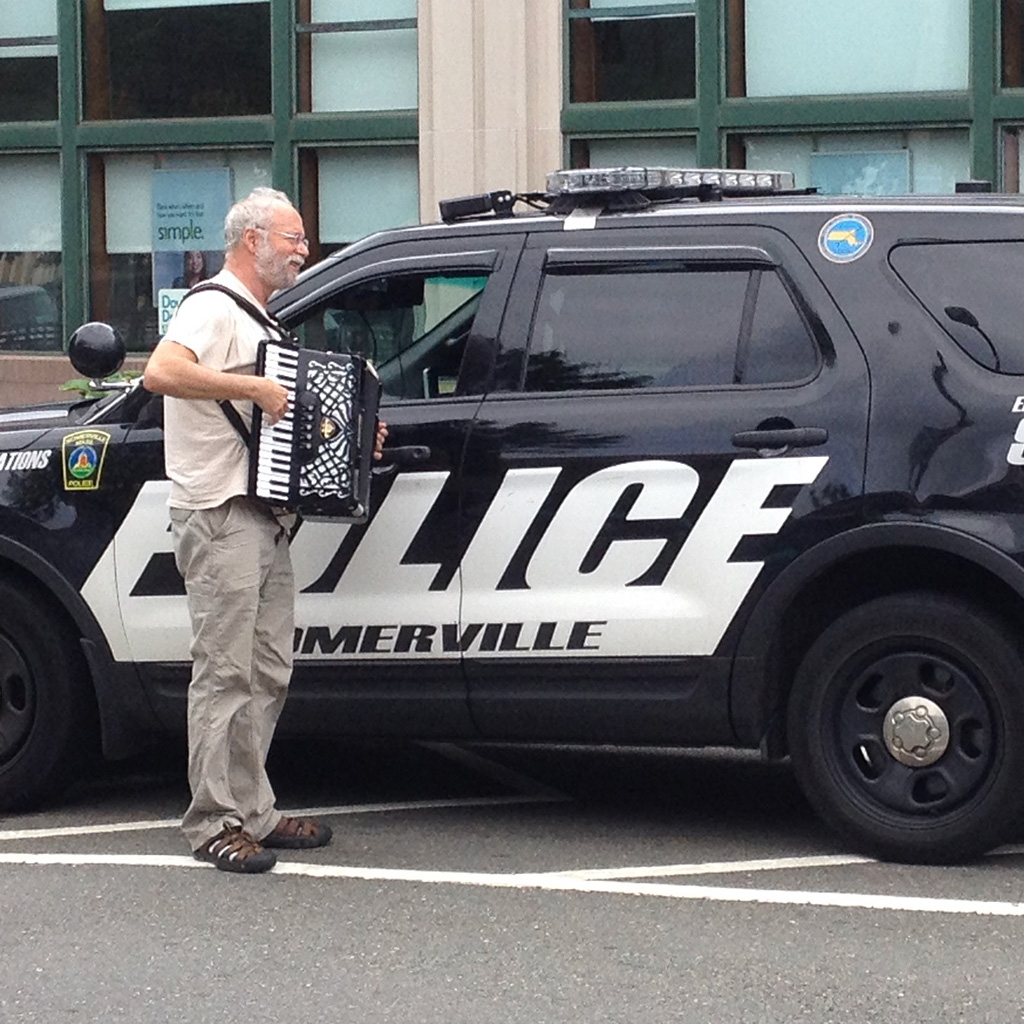Underfunding and limits from officer contracts can hobble police oversight board, expert warns

A street musician visits with police June 14, 2014, in Somerville. (Photo: Marc Levy)
As Somerville heads toward establishing a civilian oversight body for its police department, an expert warned of compromises to expect and challenges to beware.
“Civilian oversight alone cannot solve all of the problems,” said Cameron McEllhiney, executive director of the National Association for Civilian Oversight of Law Enforcement, during a Thursday online meeting of the city’s Department of Racial and Social Justice. “However, I am a firm believer that you cannot solve the problems without it.”
From experience with civilian oversight since 1998, McEllhiney said she could point toward common challenges for watching over police behavior. Political compromises and limitations from statutes, contracts and collective-bargaining agreements can be “impediments to the oversight that you had hoped for,” she said.
Under-resourcing is another challenge.
“Sometimes the city will short the agency the necessary staff and training needed because of budgetary considerations, and if a board or staff don’t have the training that they need, they are really being set up for failure,” she said.
In neighboring Cambridge, a 39-year-old Police Review and Advisory Board does not have its own staff to investigate incidents, instead using police department staff. The board has been criticized for failing to follow up on citizen complaints, including lying to residents who filed them; in 2019 the body was rebuked by the Office of the Attorney General’s Division of Open Government. Last month it was learned that the board had failed to file quarterly reports about its actions for years and hadn’t undertaken required reviews of proposed police budgets with city councillors.
Talk began in 2020
In Somerville – which is also conducting a search for a permanent police chief and building a new police headquarters – another challenge could be how long it takes to set up an oversight body. McEllhiney said it is hard to manage community expectations.
“Most communities have been waiting for this for longer than most of the people have been alive,” McEllhiney said. “They want change, and they want it now. They want it decades ago.”
Conversations about civilian oversight of the Somerville Police Department began in the summer of 2020 in the aftermath of the murder of George Floyd by a police officer in Minneapolis. The City of Somerville says its vision for civilian oversight includes recommendations made by a task force that will be sent to Mayor Katjana Ballantyne sometime this year.
Relationships are vital
Thursday’s informational webinar was led by Somerville’s director of racial and social justice, Denise Molina Capers.
Before launching into an interview-style format in which Capers questioned McEllhiney about her experience forming civilian oversight bodies, McEllhiney talked about how oversight fits into solving problems with policing and how an oversight agency communicates with the community and the department it oversees.
“It is important for civilian oversight to maintain its structural, political and organizational independence, but still have relationships with law enforcement and all members of the community,” she said. “With law enforcement, that might look like making sure that you have open communications, that you are talking to them about what you’re seeing, what you’re hearing and what the community’s saying that it needs.”
It’s not easy to keep everybody happy, however.
“We often say when civilian oversight is doing its job right, really everybody’s upset with them,” McEllhiney said. “Because a lot of times, if civilian oversight sides with law enforcement, the community might be upset and vice versa.”
No money from police
Members of the public were able to ask questions during the webinar, but their names were not disclosed publicly. One member of the public asked about funding for civilian oversight bodies.
It typically comes from the city budget. “Taking money from law enforcement for civilian oversight sets up an adversarial situation before you’ve ever opened your doors for business”though it may be the only option for a city in a fiscal crisis, McEllhiney said.
The webinar followed two others that reviewed civilian oversight models, one in English and one in other languages common in the city. The next webinar, March 16, will be a review of the SPD’s current processes and procedures. In April, another will be held with guests from municipalities in Massachusetts with civilian oversight boards. In May, a newly formed task force tasked with making recommendations for civilian oversight will be available for community feedback.




